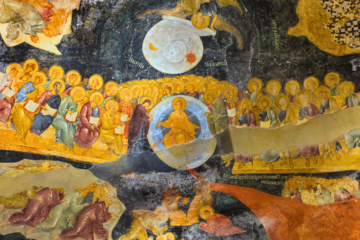We have begun a most blessed and important and joyful time of the year; Great Lent. If fully utilized, Great Lent can be a most rewarding experience. It brings us to Holy Week and Pascha wherein we celebrate the culmination of our Lord and Savior Jesus Christ work on earth, His Passion and Resurrection. The Church, over her 2,000 year existence has set aside the time of Great Lent to help us better able participate in the events that grant us our salvation. In this sense we owe ourselves to try and make Great Lent a meaningful experience.
Lent is a time of change: a change of diet, a change of focus, a change of mind and a change of heart. All these changes, from the physical change of diet, the mental change of focus, the rational change of mind and the inner spiritual change of heart lead to the same end—God. The most basic and, for some, the most difficult change is the change of diet. To give up meat is debated and questioned and opined as “no longer needed”; “old world”; “not relevant”; “too hard”; “is not spiritual”; “has no benefit”; “legalistic”; “Jesus does not care what I eat”; this list can go on and on—and I have heard them all, (I am smiling as I think of all the excuses I have been told). Yet, it is the understanding of the Church that if we can give up meat, we can experience and meet the “Bread of Life” (cf. John 6:30-ff), Jesus Christ! Bishop Kallistos Ware writes, “In both the Old Testament and the New Testament fasting is seen not as an end in itself, but as an aid to more intense and living prayer, as a preparation for decisive action or for direct encounter with God” (see, Matt. 4:1-11; Exod. 34:28; 1 Kings 19:8-12; Acts 10:9-17). The change of diet coupled with the other changes listed above make us receptive to God and His salvation. It leads to the one basic and necessary change that we call Metanoia, repentance.
Repentance causes us to rethink who we are and where are going with our lives. We reorient ourselves, forgetting about the past, and moving forward. Fr. John Chryssavgis in his book, Soul Mending: The Art of Spiritual Direction writes, “Repentance is resurrection begun. Repentance (Metanoia) not only prepares us for Pascha; repentance is itself the beginning of the Passover into life.” As we change and reorient ourselves and refocus our efforts towards God, we begin to experience the joy and power of Pascha and the resurrection of our Lord. St. Paul expresses this in a slightly different terms: “The things I do forgetting what lies behind and straining forward to what lies ahead” (Philippians 3:13). The past is gone and there is nothing we can do to change it. But we can change where we are going. First, we must assess where it is we are going and then make the appropriate adjustment. This is the essence of metanoia or repentance. But this change is not a passive thing. St. Paul is stresses in Philippians to strain forward. Make the effort to stretch towards God and stretch yourself, your soul to His salvation. This same idea is proclaimed by St. John the Baptist when he announces, “Repent for the Kingdom of Heaven is coming…” (Matthew 3:2). Fr. John Chryssavgis states, :[The] primary orientation of repentance…is not toward our past but toward our future which has become much brighter in the light of the divine mercy, forgiveness and hope offered in Christ Jesus.”
At the heart of Great Lent is repentance. All that we do, fasting, the services, the charity; all our personal and communal effort is for repentance. This repentance is not an end itself but takes us to a place, and to a person! Repentance brings us to the foot of the Cross. repentance places us before the empty tomb. Repentance brings us to our all-loving all-merciful Lord, Jesus Christ. The goal of repentance is not to focus on how bad we were or are or to compare ourselves to one another or to a saint. Repentance goal is to bring into a close, humble, and loving relationship with God. It stretches us into His kingdom. Fr. John relates this truth so eloquently when he writes: Repentance, accordingly, becomes not a repellant magnification of our deformity but an attractive reflection of God’s beauty. It is an invitation not to hopeless guilt but to freedom and responsibility. The purpose is not that we be ashamed, as though this were an end in itself. Demoralization is not the goal. The aim, rather, is true life, a life characterized by honesty, integrity, and personal accountability to God, to all others and to oneself. Only such a life and bring inner peace and happiness. The phrase “The aim…is true life…” is key. It reminds us that our goal is life, life eternal. Thus, the words of our saving Lord ring so loud and true: “I came that they might have life, and that they may have it more abundantly” (John 10:10). The growth in Christ and the work repentance is to give us this “true life”, this abundant life that only God sustains and provides.
As we enter into Great Lent, I invite and encourage you to join the expedition to God. Allow this blessed time to become a wonderful time to begin to experience the joy and peace of our Lord’s life-giving death and resurrection. Stretch yourselves forward that God may extend His mighty hand and draw you to Him and His salvation!
Fr. Thomas J Zaferes



0 Comments